RHYMA Master
Presentation
The University Master Degree in Water Resources and Environment (RHYMA) was implemented in the 2008/2009 academic year (BOJA nº 133, July 17, 2009). It is an official Postgraduate degree, registered in the Registry of Universities, Centers and Titles (BOE nº 103, April 29, 2010, Sec. III, page 37679).
The purpose of the Master's Degree in Water Resources and Environment (RHYMA) is to provide answers to the rising request for professionals specialized in the sustainable management of water, an essential and strategic resource that is becoming ever scarcer. The programme offers training in advanced and multidisciplinary techniques in water resources, with expertise in the functioning of aquifers and skills to evaluate, protect, and manage water in a sustainable way for environmental preservation.
Upon the completion of the master's degree, graduates will be able to successfully contribute to the resolution of environmental problems concerning water, at national and international level, within public administrations or private corporations. Moreover, this master offers the possibility of continuing your research training as a PhD student.
To obtain the Master Degree in Water Resources and the Environment, at least 60 credits will be necessary to take and pass, distributed as follows: 30 credits of compulsory subjects, 10 credits of elective subjects, 8 corresponding to Internships and 12 credits of the Master's thesis.
Offering just 20 vacancies per edition, the Master's Degree in Water Resources and Environment guarantees a personalized training, in which each student receives the necessary assistance to achieve its academic and professional goals. Throughout 17 editions, nearly 300 students have taken part in this training programme, with a success rate reaching 87%. Our graduates are currently working in several countries, such as Germany, Australia, Holland, Chile, and USA, testifying the quality and international scope of the received formation.
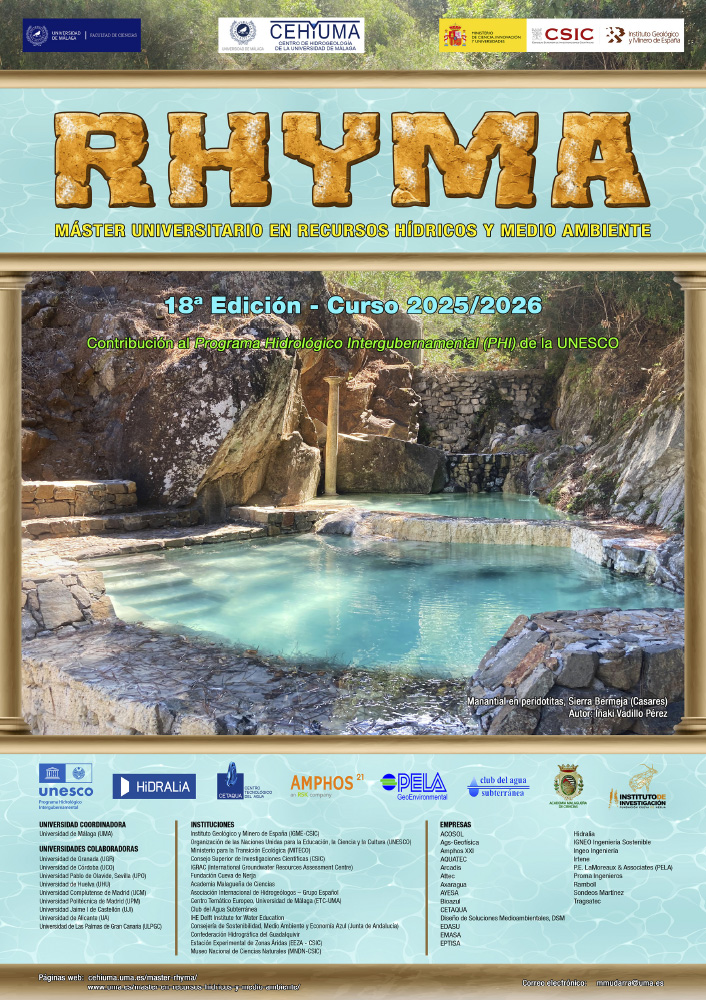
Manantial Award 2022 Video

Number of places and place of teaching
The number of admitted will be about 20.
Classes of the RHYMA Master will be taught in the Ada Byron Research Building, located in the extension of the Teatinos Campus of the University of Malaga.
Teaching is completely face-to-face and is given in classroom A.0.1 - A.0.2, on the ground floor of the building, to the right of the reception.
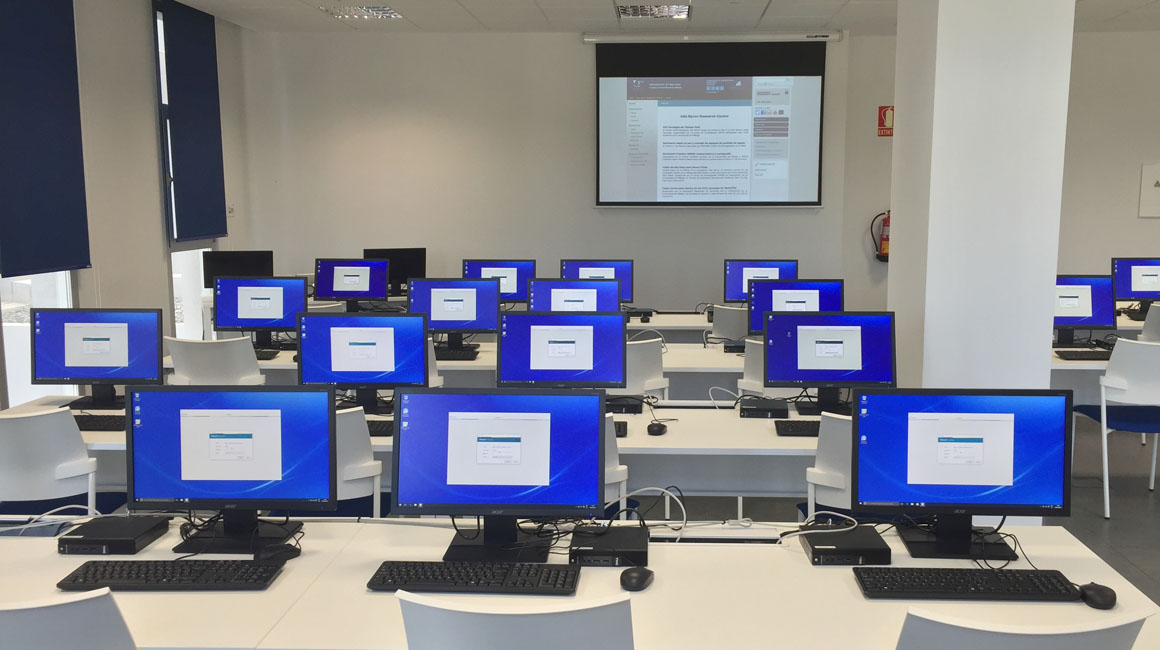
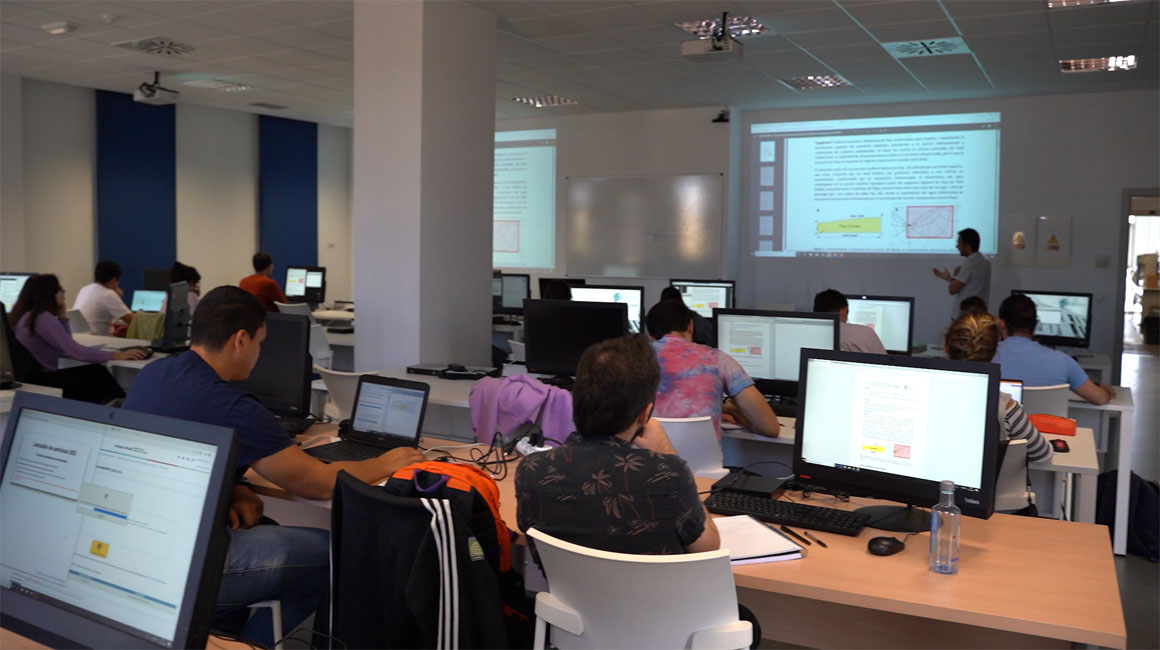
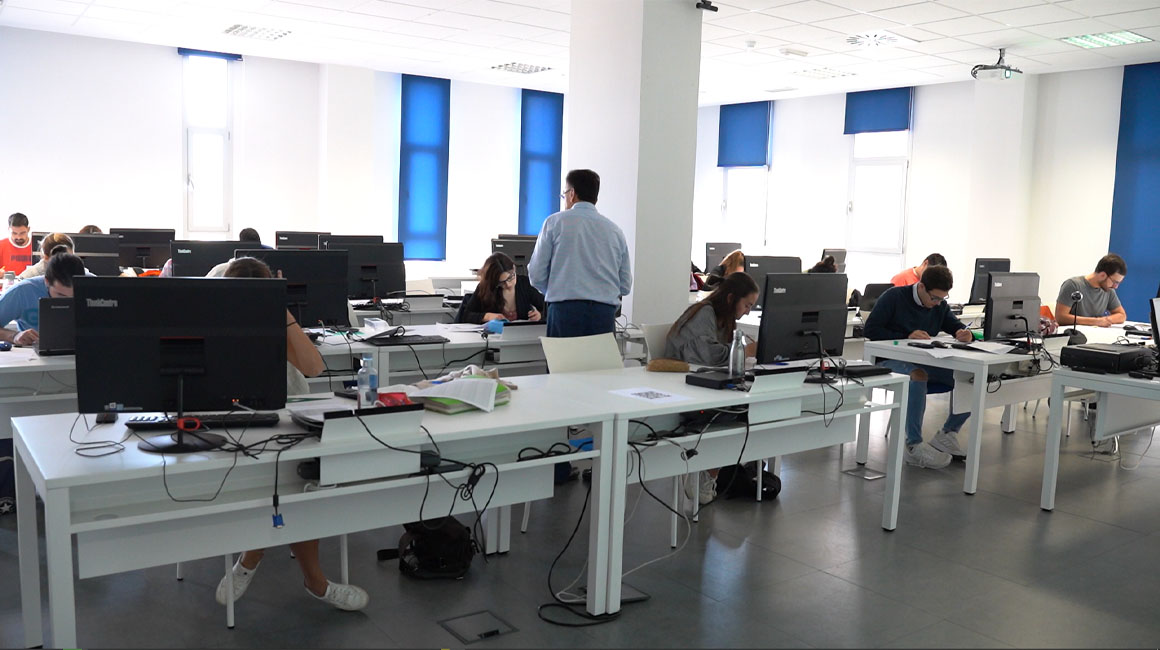
Entry profile and requirements
Admission to the Master is open to graduates in Geology, Environmental Sciences, Geography, Biology, Chemistry, Mining Engineering, Civil Engineering, Agricultural Engineering, Geological Engineering, Chemical Engineering or Industrial Engineering. Likewise, applications from other higher degrees in related disciplines will also be considered, as long as sufficient training in matters related to the master programme's content is accredited.
Applicants with diplomas issued by foreign centers in training equivalent to Spanish degrees may have access to the Master's programme without the requirement to homologate its university degree, as long as previously accredited proof be provided to demonstrate that this qualification entitles the applicant to enroll in postgraduate studies in the country where the degree was issued.
Selection criteria
The selection criteria are: the academic record (60%) and the curriculum vitae (40%). Certificates of proficiency in spoken and written Spanish will be required for those students coming from a country whose main language is other than Spanish. Those will be rejected if unable to fulfil the minimum requirements.
Prices of admission
The approximate amount of the Master, according to the current public prices in the 2023/2024 academic year, was 820 euros (16.68 euros/ECTS), plus about 60 euros of administrative fees.
Scholarships and grants
The UMA Scholarship Service (https://www.uma.es/becas) announces and manages the wide range of scholarships aimed at students at the University of Malaga. In addition, attempts will be made to obtain grants for scholarships from some institutions collaborating with the Master's. Depending on the financial availability of the Master, up to two accommodation scholarships for students will be offered for an amount of 1000 euros each.
Dates and deadlines for pre-registration
According to the regulations on Admission to university in Andalusian public universities, the pre-enrolment process for university master degrees is exclusively carried out through the online platform of the Andalusian District, which centralizes all applications for admission to any public university in Andalusia.
Application procedure is divided into three phases:
- Phase 1 (exclusive for applicants with foreign degrees).
- Phase 2 (regular)
- Phase 3 (extraordinary)
For information regarding the dates of evaluation processes, publication of lists and reviewing or complaints, please visit the web site of the Distrito Único Andaluz.
Applications for pre-registration for Official Master's Degrees will be submitted online
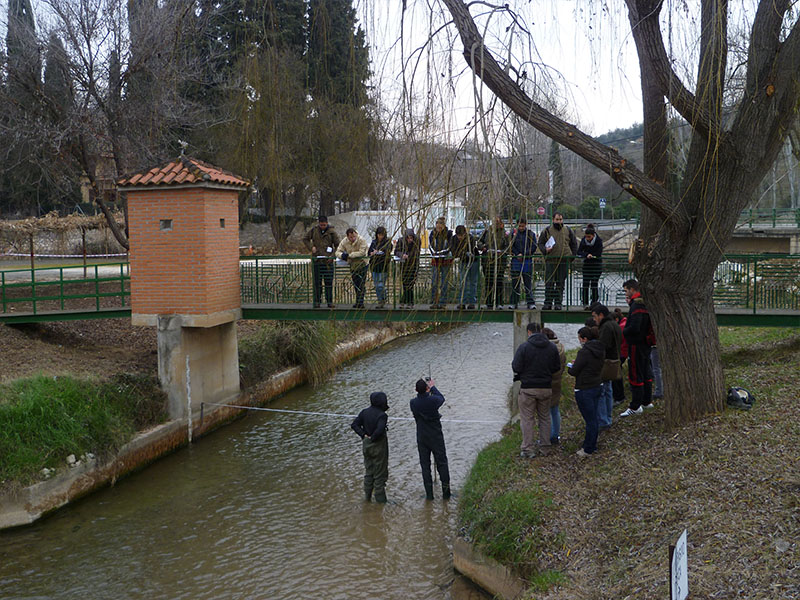
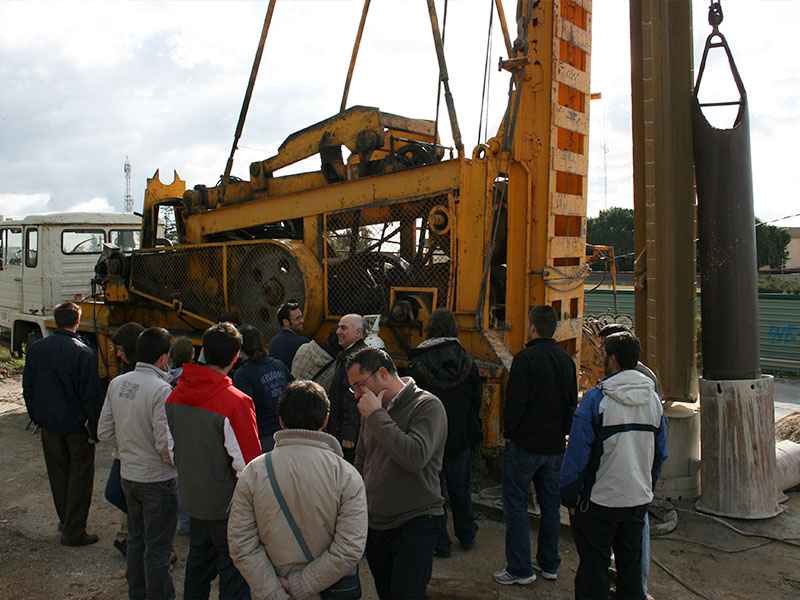
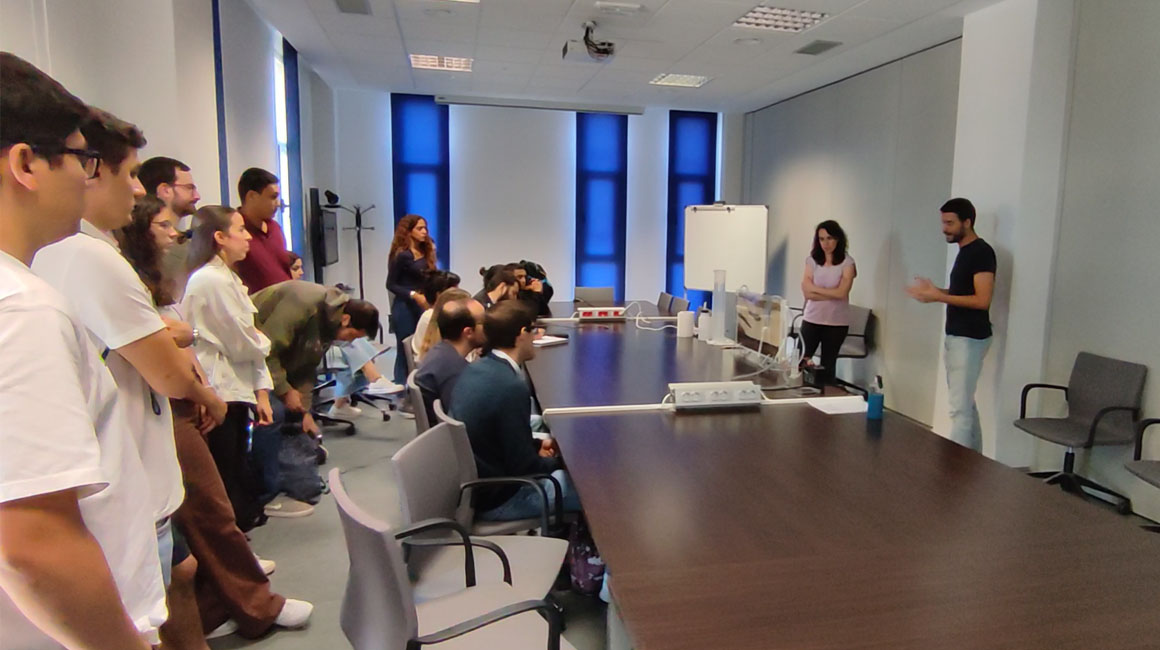
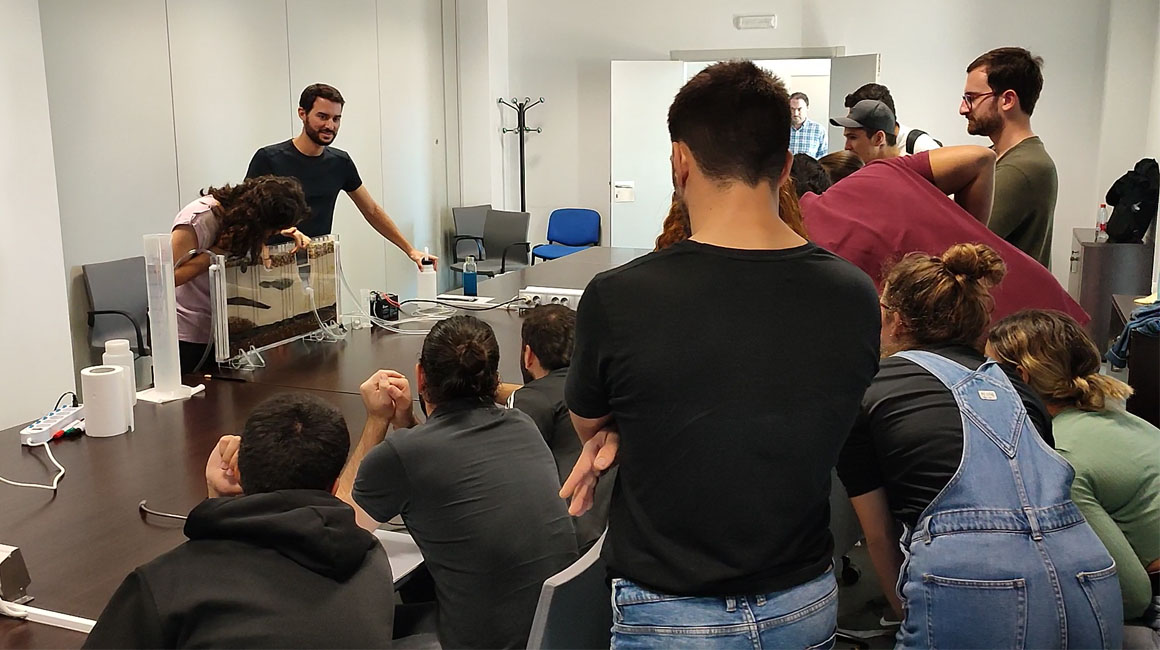
More information
Date of publication of the title in the RUCT: Resolution of April 7, 2010 of the General Secretariat of Universities (BOE nº 103, April 29, 2010, sec. III, page 37679)
Implementation academic year: 2008/2009 (RD 56/2005), adapted to RD 1393/2007 in the 2009/2010 academic year.
Number of courses in the implementation phase: fully implemented
Branch of knowledge: Sciences
Duration of the program: 60 ECTS / 1 year
In the case of part-time studies, the minimum number of ECTS credits for enrollment per student and school period will be 30 ECTS. Part-time student status will be obtained according to the official procedure of the Science Faculty and the University of Malaga.
Type of teaching: face-to-face
Students are eligible for the part-time regime by accrediting some of the circumstances listed in the regulations and obtaining the explicit recognition of this situation through a justified request from the UMA department with competence in matters of students. This recognition will be effective for a temporary period of one academic year.
Languages used to teach the degree: Spanish and, sporadically, English
Rules of permanence: Without prejudice to the competence that art. 46.3 of the Organic Law 6/2001, of Universities, grants the Social Council to establish the norms that regulate the progress and permanence of the students, in accordance with the characteristics of the respective studies, the Statutes of the University of Malaga, in its art. 124, generally establish for all degrees a maximum number of six exam sessions that students may attend to pass each of the subjects that make up the respective study plans. For this purpose, only the exam calls to which the student has attended will be computed. Students who have exhausted three or more calls will have the right to request the constitution of a tribunal to examine them.
Objectives: training for technical work in public administrations and companies, and training for research and doctorate.
Competencies:
- Carry out basic scientific research tasks within the framework of R & D & i projects.
- Prepare or carry out technical projects on water resources and the environment in public administrations or private companies, together with specialists from other fields of knowledge.
- Know the components of the hydrological cycle, as well as the impacts derived from human activity and their mitigation.
- Know the research methods to evaluate water resources and know the hydrological and hydrogeological functioning in different types of land.
- Characterize the natural quality of water and pollution processes, and develop protection strategies.
- Know scientific criteria to determine the importance of water in areas of special environmental interest and learn to carry out an environmental impact assessment.
- Carry out hydrological planning and sustainable use of water resources, through adequate management and compatible with the environment, based on hydrological-hydrogeological research.
- Know basic aspects of water legislation and economics that emanate from European directives and are a reference for European convergence in water matters.
Graduate profile of the degree graduates: Master's Degree in Water Resources and Environment
Academic prospects in relation to other studies: Doctorate
Professional opportunities: public and private companies, consultancy and public administrations related to water resources and the environment
Profile of new students: Graduates (Bachelor or Degree) in Geology, Environmental Sciences, Geography, Biology, Chemistry or Mining Engineering, Civil Engineering, Agricultural Engineering, Geology, Chemistry or Industry. Likewise, applications from other higher degrees in related disciplines will also be considered, as long as sufficient training in matters related to the content of the RHYMA Master is accredited.
Support information and guidance for new students
- Activities developed by the University of Malaga: open days, orientation fairs in places of origin of the students (especially in Andalusia), website, magazines and information brochures, information points on campus.
- Meeting prior to the start of each course of the RHYMA Master to report in detail on all aspects related to the degree (programming, content, classrooms, hours, professional orientation, job placement).
- Monthly meetings with the group of students to monitor teaching, academic results and about the virtual classroom.
- Use of the virtual classroom and email as support and guidance tools in the development of teaching activity.
- Permanent service of personalized attention by the coordination of the Master, both face-to-face and online.
- Personalized management of the destinations of the External Internships and Master's Thesis.
- Access to the technical and research staff of companies, universities and research centers, to know the details of the activity carried out in each of them.
At the beginning of the course, a virtual classroom is provided by the University of Malaga in the Virtual Campus platform. It contains all the material related to the teaching-learning (theoretical and experimental classes, figures, photos, bibliography, etc.). This platform will be used to notify any activity or news related to the Master. Thus, all students can receive this information in their e-mails. The virtual room offers the possibility to interact with students through discussion forums, instant messaging and suggestion boxes.
At the end of each subject/course of the Master's program, a survey in which the students can evaluate the available facilities, subjects, contents, and the structure of the program will be carried out. This survey also constitutes the main source of information to evaluate the teaching activity of the professors and obtain suggestions for improvements.
Feedback from the people in charge of those companies and institutions collaborating with the Master's program is collected and analysed.
In addition, there are individualized tutorials and meetings for follow-up, guidance and learning support.
Access and admission requirements: academic record (60%) and curriculum vitae (40%). Certificates of proficiency in spoken and written Spanish will be required for those students coming from a country whose main language is other than Spanish.
Level of supply and demand for places and enrollment: According to the verification report of the Master's Degree, the maximum number of admitted students will be 20.
Implementation schedule
Fully implanted
1. Memoria Verificada por ANECA
2. Informe de Verificación emitido por ANECA
3. Autoinforme (Convocatoria 2011/2012)
4. Informe de seguimiento (Convocatoria 2011/2012) emitido por la Agencia Andaluza del Conocimiento
5. Autoinforme (Convocatoria 2012/2013)
6. Autoinforme (Convocatoria 2013/2014)
8. Autoinforme global de renovacion de la acreditacion (Convocatoria 2014/2015)
10. Resolución de Renovación de la Acreditación emitido por el Consejo de Universidades
11. Autoinforme (Convocatoria 2015/2016)
12. Informe de seguimiento (Convocatoria 2015/2016) emitido por la Agencia Andaluza del Conocimiento
13. Autoinforme global de renovación de la acreditación (Convocatoria 2018/2019)
14. Informe global de renovación de la acreditación (Convocatoria 2018/2019)
15. Informe de Seguimiento del Plan de Mejora
16. Informe global de renovación de la acreditación (Convocatoria 2024/2025)
Minor modifications made to the Study Plan
Originally, it was planned to start teaching in the months of October, coinciding with the start of each academic year but, in the 2010/2011 edition, it was decided to delay the start by a month in order to avoid the late incorporation of some students who They access after the last adjustments in the process of selecting students for the masters of the Andalusian Unique District. After the experience of the academic year 2011/2012, it has been considered appropriate to establish the start of the course in the month of November.
On the other hand, the maximum admissible number of students established in the Verification Report was 20 students per year, although the Single District of the Junta de Andalucía has received the indication that the minimum number of students admitted to the master's degrees, with In general, it must be 25 (2011/2012) or even 30 (2012/2013). The increase in the number of students in this Master is not usually accompanied by an increase in employability (especially in the current situation of economic crisis) and, however, makes it difficult to manage internships, especially when (as is done in the RHYMA Master), an attempt is made to find appropriate internships for students in their previous training, in companies and institutions in other countries, because the national labor market is bad for young graduates.
These two modifications have been accepted by the Andalusian Knowledge Agency, as indicated in the joint monitoring report of the 2012/2013 and 2013/2014 calls. In any case, these are minor modifications, so they have not been communicated to the Council of Universities.
Overview of the structure of the curriculum
Information about the subjects
- Module I: Conceptual bases
- Module II: Basic techniques of sampling, data collection and exploration of water resources
- Module III: Research on water resources in different types of media
- Module IV: Water quality, pollution and protection
- Module V: Water and Environment
- Module VI: Water resources and sustainable development
- Module VII: Projects and applied studies on water resources and the environment
- Module VIII: Legislation and economics of water
- Module IX: Internships in companies or in research centers
- Module X: Master's Final Project
More information in the ANECA Verified Report
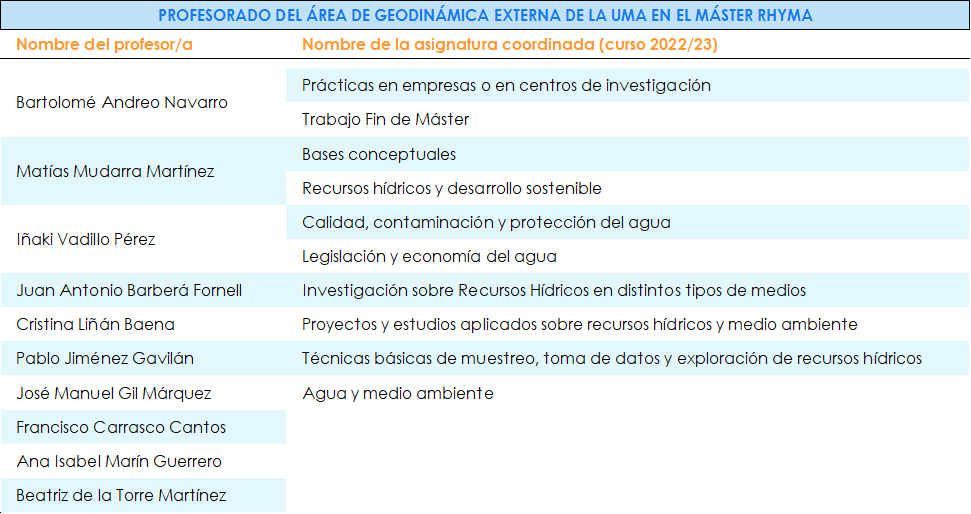
The material resources (classrooms, laboratories) of the Ada Byron building and the Hydrogeology Center of the University of Malaga are available.
Classroom for theoretical and practical classes equipped with a video cannon and Internet connection, as well as an individual computer.
The laboratory of the Hydrogeology Center of the University of Malaga is available for practical classes. For field practices, there are itineraries through the province of Malaga and other neighboring areas, as well as equipment for measuring hydrological and environmental parameters.
In addition, the Master is provided with its own space in the Virtual Campus of the University of Malaga, a virtual teaching-learning environment developed by the Virtual Teaching Service and Technological Laboratories. It is based on the MOODLE open source platform, widely used by the educational worldwide community. The master's virtual room includes links to virtual workstations (as many as the number of students enrolled in the Master + an additional one for professors) hosting the required software used during the practical sessions during lectures and workshops sessions in the classroom.
Quality Assurance System
In accordance with the UMA Master's Degree Studies Regulations, the RHYMA Master's Degree is subject to the Quality Assurance System of the Faculty of Sciences.
The body responsible for the implementation and monitoring of the Quality Assurance System is the Quality Assurance Committee.
QMS documentation and results
In the web link https://www.uma.es/facultad-de-ciencias/cms/base/ver/base/basecontent/75015/calidad-ciencias/ you have access to the annual reports of results, indicator measurements and quality objectives, in addition to the manuals and procedures of the center's QMS in which the RHYMA Master is included.
Those who take the University Master's Degree in Water Resources and Environment (RHYMA) may take advantage of general actions or programs established by the University of Malaga or by any other institution.
The RHYMA Master is part of the Erasmus Mundus Program.
Project: Spatial ICT Infrastructures for Smart Places. ERASMUS MUNDUS Action 2 from the EU.
Reference: 545696-EM-1-2013-1-AT-ERAMUNDUS-EMA21
In addition, for the RHYMA Master there are Erasmus and other Agreements with universities in several European countries:
- France: Université Montpellier2, Université de Franche-Comté. University of Corse, University of Rouen and University of Bordeaux
- Italy: Universita'Degli Studi di L'Aquila
- Greece: University of Patras.
- Slovenia: University of Nova Gorica.
- Germany: Albert-Ludwigs-Universität Freiburg.
Besides, the University of Malaga, through the Student and Employability Vice-rectorate, takes part in the Rural Campus Program, allowing students to carry out academic internships in centres whose facilities or activities are based in rural municipalities with depopulation problems.
There is a large number of Agreements with institutions and companies, national and international, that allow the mobility of students for external internships.
Coordinators
Prof. Dr. Bartolomé Andreo Navarro (Professor of External Geodynamics and Director of the Center of hydrogeology of the University of Málaga)
Department of Ecology and Geology
Science Faculty. University of Málaga
Bulevar Louis Pasteur, 31, 29010 Málaga
Email: andreo@uma.es
Phone: (+34) 952132004, 951952961
Fax: (+34) 952137386
Web: https://cehiuma.uma.es/
Department of Ecology and Geology
Science Faculty. University of Málaga
Coordinator functions
In accordance with the UMA Master Studies Regulations, the functions of the Coordinator are the following:
a) Assisted by the Academic Committee of the Master, ensure adequate coordination and scientific and thematic coherence of the contents of the modules, subjects and subjects that are integrated into the Master, ensuring that the scientific level is adequate for the level of studies University Master's Degree.
b) Take responsibility for the academic monitoring of the degree, setting up and coordinating the actions deemed necessary, in accordance with what is approved by the Center. In particular, it will ensure that all the actions provided for in the Certificate Verification Report and in the regulations of the University of Malaga on the quality assurance of degrees are carried out.
c) Take responsibility, within the degree, and in agreement with the Dean / Director of the responsible Center and the Center Board, the processes of accreditation and verification of the Master's degree and other similar to which the degree may be subjected by agencies of national or regional evaluation or of the internal bodies of the University of Malaga, taking charge of organizing and preparing the documentation that may be necessary, always under the supervision of the Dean or Director of the Center responsible for the degree, and of its Center Board.
d) Carry out the tasks of academic and economic management internal to the Master, approved by the Center, as well as the external tasks that may be necessary for the adequate coordination of the degrees within the center to which the Master is assigned and, in general, of the entire University of Malaga.
e) Assisted by the Academic Committee of the Master's degree, oversee the processes for assigning the subject and tutor of the Master's Final Project, deadlines and any other aspect related to these works, following the guidelines approved by the Center.
f) Carry out an annual academic and financial report addressed to the Dean / Director of the Center, listing the actions carried out, which will be transferred to the Board of the Center for their knowledge.
g) Propose, where appropriate, to the Center's Quality Assurance Committee the improvement plans for the Master's studies and collaborate with it in the preparation and drafting of the monitoring and accreditation reports that are required in relation to the corresponding Master's degree. Academic.
h) Represent and defend the interests of the corresponding official title in those matters in which the Dean / Director of the Center delegates the competence.
i) To ensure the dissemination, among professors and students of the degree, of the information of all matters, related to the activities of the same, could affect them.
j) Maintain and update the information available on the Master's website, being able to delegate this task to whoever is considered appropriate.
Composition of the Academic Committee
Functions of the Academic Commission
The Academic Committee of the degree will be responsible for the Study Plan to be taught in accordance with the planned schedule and will decide on any questions that may arise during its development. Likewise, it will inform the Center responsible for the degree, so that it informs the Postgraduate Commission about possible modifications to the Study Plan, substitutions of teachers, requests from students regarding recognition and credit transfers, proposals from courts, systems and claims about evaluation and, in general, those other questions of an academic nature that are assigned.
Reglamento 7/2024, de 24 de junio, de la Universidad de Málaga, sobre prácticas externas
External internships will be considered as those training activities supervised by the University of Malaga that students carry out with the aim of applying and complementing the acquired knowledge in their academic training. Moreover, external internships focus on the acquisition of skills in order to prepare students for their professional career, enhance their employability, and promote their undertaking capabilities.
External internships may be carried out in the university itself or in public or private partners, either nationally or internationally.
Considerations on External Internships and their management
For the External Practices and TFM, which in this degree are done jointly for three months, there are more than fifty agreements signed (specifically for this Master) between the University of Malaga and companies or institutions (universities and research centers), in accordance with the model established for this purpose, which contains the conditions of stay of each student in practice. Each agreement refers to general obligations, working hours, insurance, registration with social security, occupational risk prevention regulations that the company must provide, etc. The agreement is the document that regulates the stay of the trainee in each company or center.
The University of Malaga is included in the ICARO program. This allows companies and entities to access a wide database of human resources with university training and to carry out a free pre-selection of those university graduates who meet the profile requested by the company. The company is provided with an appropriate set of candidates that streamlines the selection process carried out by the personnel of the company or entity offering.
The management of the External Practices and TFM between the interested parties and the centers or destination companies is carried out from the Coordination of the Master. Contacts are made and agreements are managed, sometimes at the request of the students. Experience shows that there is more motivation and success if students work on what they prefer or like the most. Likewise, financial aid is arranged with the destination companies and centers, so that students can fully or partially cover travel expenses and stays, especially when they travel to other countries.In this case, in addition, insurance is always arranged additional to school insurance, in accordance with the clause established for this purpose in the agreements. When there is an agreement between the parties on the place and purpose of the External Internships, then the proposal is submitted to the Academic Committee of the Master for approval. During the internship, the Coordinator maintains some interaction with the tutors and with the students, in order to detect possible problems or anomalies.
From the academic year 2023/24, students who undertake training internships, whether paid or unpaid, are included in the National Insurance System. The UMA is responsible for paying contributions to the Social Security Treasury during the internship period, unless the internship is financially remunerated. In the case of receiving a salary associated with the internship, the companies will be responsible for covering the student's registration fees in the General Social Security System, releasing the university from this responsibility. Likewise, if the student's work/salary conditions change during the internship, this change must be indicated to the Master's coordinator at the earliest time possible, especially if it involves a change in the responsibility for the Social Security contribution costs.
The students have a company / center tutor and an academic tutor, who guide them on the activities to be carried out and how to proceed, each in their field of competence, during the External Practices and the TFM.
The internship tutor is the person of reference during the student's stay at the destination. In addition to tutoring the student's training, the tutor must inform the student of all the details and aspects to take into account for the proper development of their practices and will always be the person of consultation for the student at that time.
In accordance with current regulations (BOE of 2014), at the end of the External Internship, students and tutors of collaborating entities must make a report and send it to the academic tutor, who is responsible for carrying out the evaluation.
The students' report will include the following aspects: a) personal data of the student, b) collaborating entity where they have carried out the practices and place of location, c) specific and detailed description of the tasks, work carried out and departments of the entity to which they that has been assigned, d) assessment of the tasks carried out with the knowledge and skills acquired in relation to university studies, e) relation of the problems raised and the procedure followed for their resolution, f) identification of the contributions that, in the matter of learning, have involved the practices, g) evaluation of practices and suggestions for improvement.
The report of the tutor of the collaborating entity will collect the number of hours worked by the student and will be able to assess the following aspects: a) technical capacity, b) learning capacity, c) administration of works, d) oral and written communication skills, e) sense of responsibility, f) ease of adaptation, g) creativity and initiative, h) personal involvement, i) motivation, j) receptivity to criticism, k) punctuality, l) relationships with their work environment, m) ability teamwork, n) those other aspects deemed appropriate.
List of companies and institutions with which there is an Agreement, according to the established Model, for RHYMA Master's Degree Internships
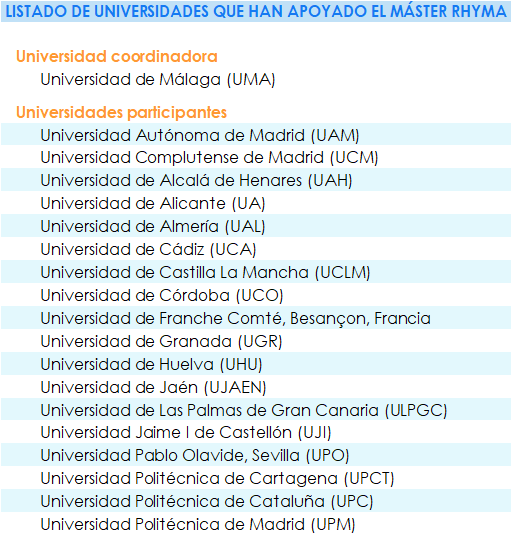
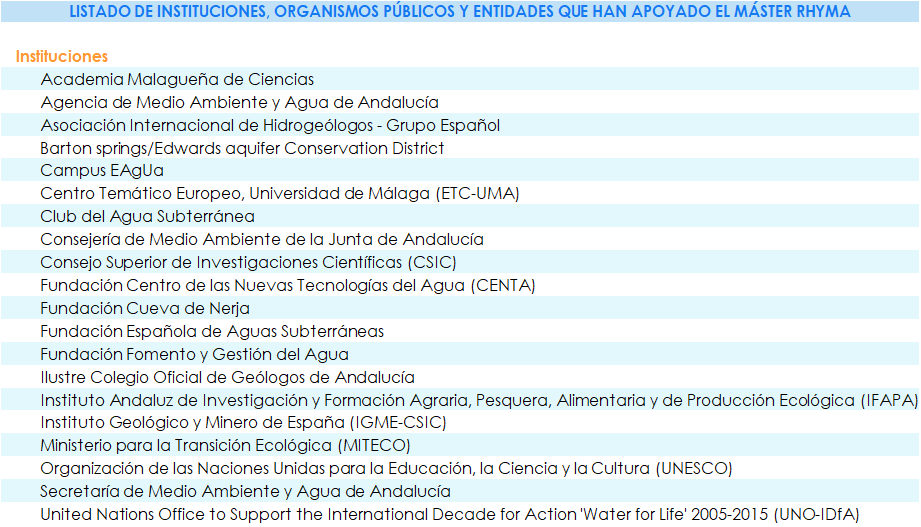
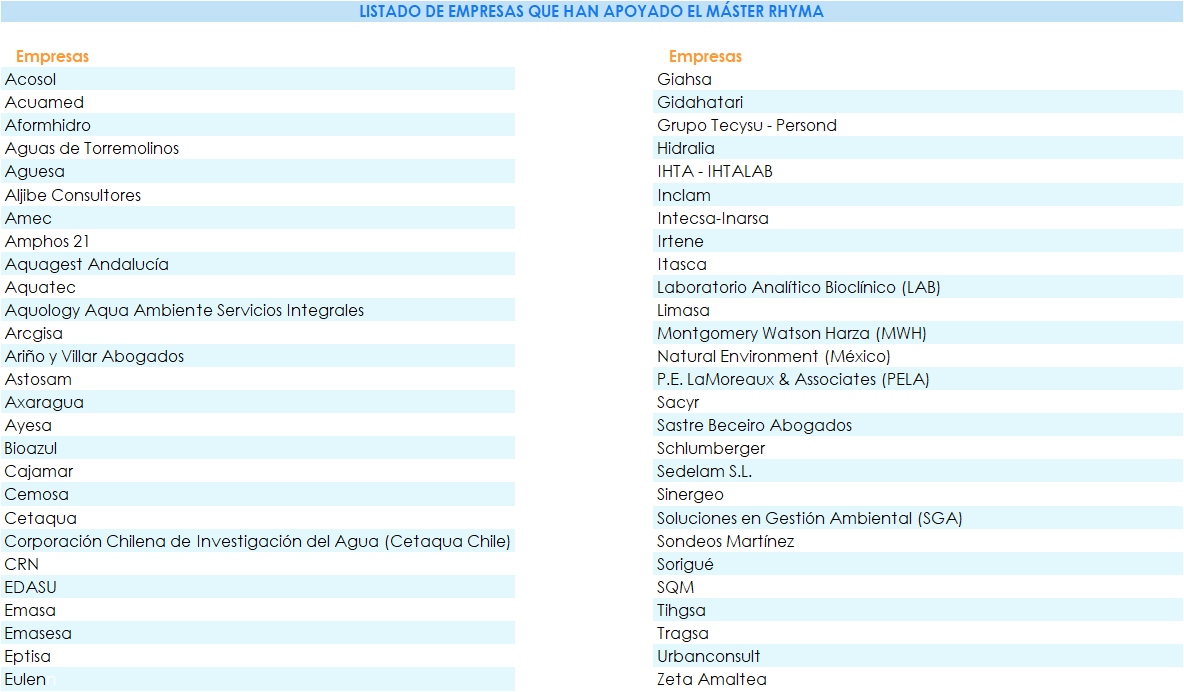
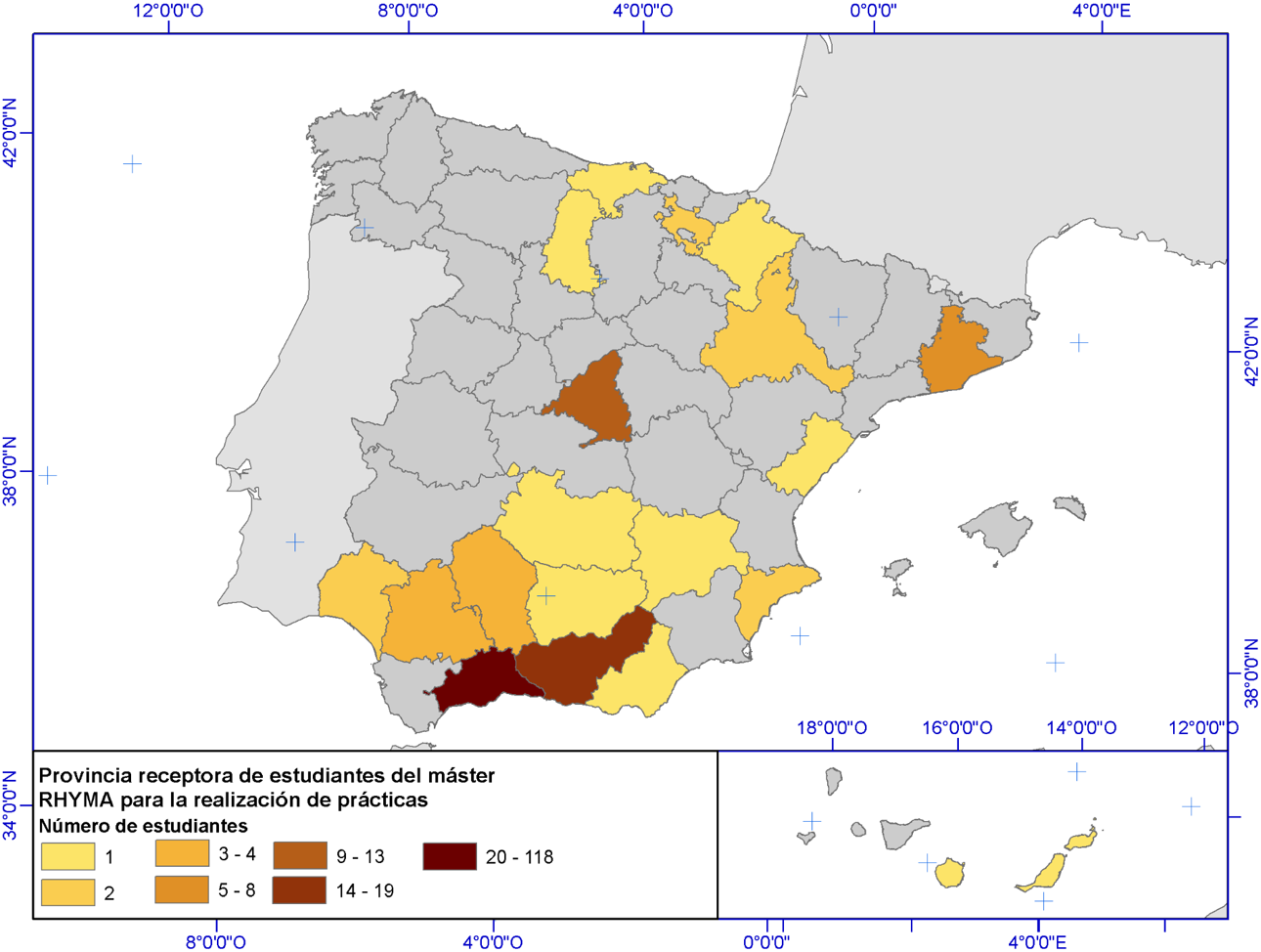

TFM Regulations - Faculty of Sciences
TFM Regulations - University of Malaga
Nomative updated on TFM December 17, 2018
In the RHYMA Master, the TFM is done jointly with the External Practices, for a period of three months, in order to promote labor insertion.
TFM options
A) Work focused on technical-professional activity (mainly in Companies and Public Administration). In this case, it is a question of doing a work or technical report that may have a scientific approach, but it will be focused on issuing a diagnosis of a hydrological-environmental issue, characterizing the environment or the study area, evaluating the problem in question and, then, make an analysis of the results and a proposal of alternatives (with their advantages and disadvantages), to end with the conclusions and recommendations that are considered more appropriate.
B) Work focused on research (in Universities and Public Research Bodies). In this case, the following reference content is suggested: introduction, objectives, methods, results, interpretation and discussion, and conclusions.
Selection/assignment criteria and profile of the TFM and External Internship faculty
In the TFM and External Practices, which in the RHYMA Master are done jointly for three months, there is always a company or research center tutor and an academic tutor, who guide them on the activities to be carried out and how to proceed, each one in your area of expertise. In all cases, the academic tutor is a Master's professor.
For each option (technical-professional or research) of TFM, there are professionals / technicians from companies and professors / researchers from universities and research centers who regularly collaborate with the RHYMA Master. Of all of them, there is information about their trajectory and work / research experience, as well as tutoring of students in practices. The annual offer of places for practices of each center or company is also known.
First, the student chooses the option of TFM that he prefers, as well as the place (company or center) and the subject on which he wants to do the External Internships and TFM. Then, the availability of places is consulted or, where appropriate, the requested option is expressly sought, if it is not among the list of companies or centers with which there is an established agreement. Then, according to availability and generally in accordance with what is requested by the student, an academic tutor (professor of the Master) and a company or research center tutor are assigned, whose technical or scientific profiles are better aligned with the subject, characteristics and previous training of the student.
In a TFM with a research focus, tutors are assigned with the degree of Doctor, professor or researcher from OPIS, with experience in the subject under study, preferably with proven ability to direct research and with six-year terms, especially in the case of the academic tutor. In a TFM with a technical-professional approach, academic tutoring is assigned to a Master's professor with a Ph.D. degree and with experience in business or with experience in transferring research results, while business tutoring falls on technicians with the broader and more diverse trajectory possible, preferably with a Ph.D. degree, and with experience in tutoring.
The management of the External Practices and TFM between the interested parties and the centers or destination companies is carried out from the Coordination of the Master. The assignment of tutors, TFM and External Internships is carried out by the Academic Committee of the Master, at the proposal of the Coordinator and by mutual agreement between the students and the tutors, taking into account the general provisions of the UMA for the teaching assignment and those foreseen in the Teaching Organization Plan for each academic year.
In any case, it should be clear that the TFM is, fundamentally, for the students and they have to strive to do their homework well. The job of the tutors is to tutor, that is, to guide the students. It is important to make an effort in the work of tutoring, because the students are in the training phase and, in addition, they will be evaluated for it. However, tutors should not "do the work" for students. Tutoring a Master's Thesis is not necessarily equivalent to directing, for example, a doctoral thesis. The tutors will appear as such in the document of the Final Master's Thesis, in the place and in the way they consider most appropriate, preferably on the cover or title page of the TFM. The tutors must give their approval for the defense of the TFM.
Organization and defense of the TFM
In order to present the Master's thesis, students have to know the requirements established in the UMA and the Faculty of Science's regulations on Master's thesis.
The student will inform the Master's thesis coordinator of his/her intention to defend the work once the corresponding summons has been established. It will be mandatory to inform the mentor of this circumstance.
The Master's Thesis may have a variable length, depending on the characteristics they present in each case. For guidance purposes, in general, an extension of 50-70 pages seems adequate, although it may be more or less if deemed appropriate.
In general, the document of Master's thesis will contain an abstract (from 200 to 400 words) including a summary of the conclusions, followed by the sections related to the current state of the subject (introduction or background), goals of the work, methods and materials applied, description and presentation of the results, a discussion and a final section of conclusions, establishing the future projection of the subject, followed by the bibliographical references used. This structure may be modified, under the recommendation of the mentor(s) of the Master's thesis and/or the Academic Committee of the Master's program, to adapt or complete the document to the specific typology of the Master's thesis.
The full text of the dissertation must be reviewed, using a plagiarism detection software, by the academic mentor at the request of the Academic Committee.
The Final Master's projects will be evaluated by an Evaluation Commission made up of 3 professors, generally from the Master's degree, appointed by the Academic Commission. In order for the members of the Evaluation Commission to read the works prior to the defense act, 3 copies will be deposited, on behalf of the Coordinator of the Master, at least one week before the presenting act.
Each student will present its TFM, in a public act, through an oral presentation of 20 minutes, followed by a debate with the members of the Commission, for about 10 minutes with each one, approximately. Time control will be strict, so it is advisable to adapt the contents of the presentation to the time available and respond clearly and specifically to the questions of the members of the Committee.
Only under exceptional and duly justified reasons, the dissertation could be performed remotely through audiovisual methods. The dissertation of Master's thesis in this format must be requested by the student to the Academic Commission, which may approve or deny it with a reasoned argument.
The Master's Thesis will be graded, with a score of 1 to 10, by the Evaluation Committee, which will take into account the following criteria: presentation, content, applied work / research method, results, discussion capacity and reasoning of the student in the debate turn.
In any case, the final qualification of the dissertation, on a numerical scale from 0 to 10 points, must be included in the Tribunal's Evaluation Report, and once it is signed by all the members of the Tribunal, it will be delivered to the coordinator of the Master's thesis.
Examples of TFM and qualifications
Previous editions of the Master's Thesis can be consulted by the alumni in the repository of the Hydrogeology Centre of the University of Malaga.
Currently, the Educational Innovation Project entitled "Use of physical models on a scale for the implementation of active methodologies in the teaching of natural sciences" (PIE22-212 of the UMA) is being developed. The objectives of the project are:
- Develop and implement methodologies based on active learning in the classroom through the use of physical models of aquifers on a scale that allow assimilating processes that occur in the subsoil and that can be manipulated by students to simulate real natural scenarios.
- To evaluate the effect of the implementation of active learning, with the use of scale models, on the teaching-learning process throughout different subjects in successive courses of the Degree in Environmental Sciences and in the Master's Degree in Water Resources and Environment ( RHYMA).
- Improve horizontal coordination between related subjects of the Degree in Environmental Sciences and the RHYMA Master.
During the 2013/2014 and 2014/2015 academic years, another Educational Innovation project entitled "Development and implementation of fieldwork methodologies (thematic cartography) and cabinet (geographic information system) of subjects with geological and hydrological content of degrees was executed. courses taught at the University of Malaga (PIE13-113 of the UMA)".
With this project it was intended that students acquire autonomy, the capacity for collaboration and personal responsibility at work, important aspects of the new teaching-learning framework to which the European Higher Education Area leads. Four of the ten subjects or modules offered in the Master's Degree in Water Resources and Environment (RHYMA) were included in the project: Basic sampling techniques, data collection and resource exploration (Module II), Research on water resources in different types of media (Module III), Quality, contamination and protection of water (Module IV) and Water resources and sustainable development (Module VI).
The specific objectives of the project were:
- Optimize learning during field trips, through the design of guides or digital field notebooks for use in the various subjects.
- Introduce students to the knowledge of multi-thematic data analysis methods and techniques obtained in field work, which allow a transdisciplinary application of the geological and hydrological contents necessary for any study of the Natural Environment.
Graduates
The following maps show the origin of the graduates of the master's degree by university and province of Spain (only for Spanish universities) and by country of origin.
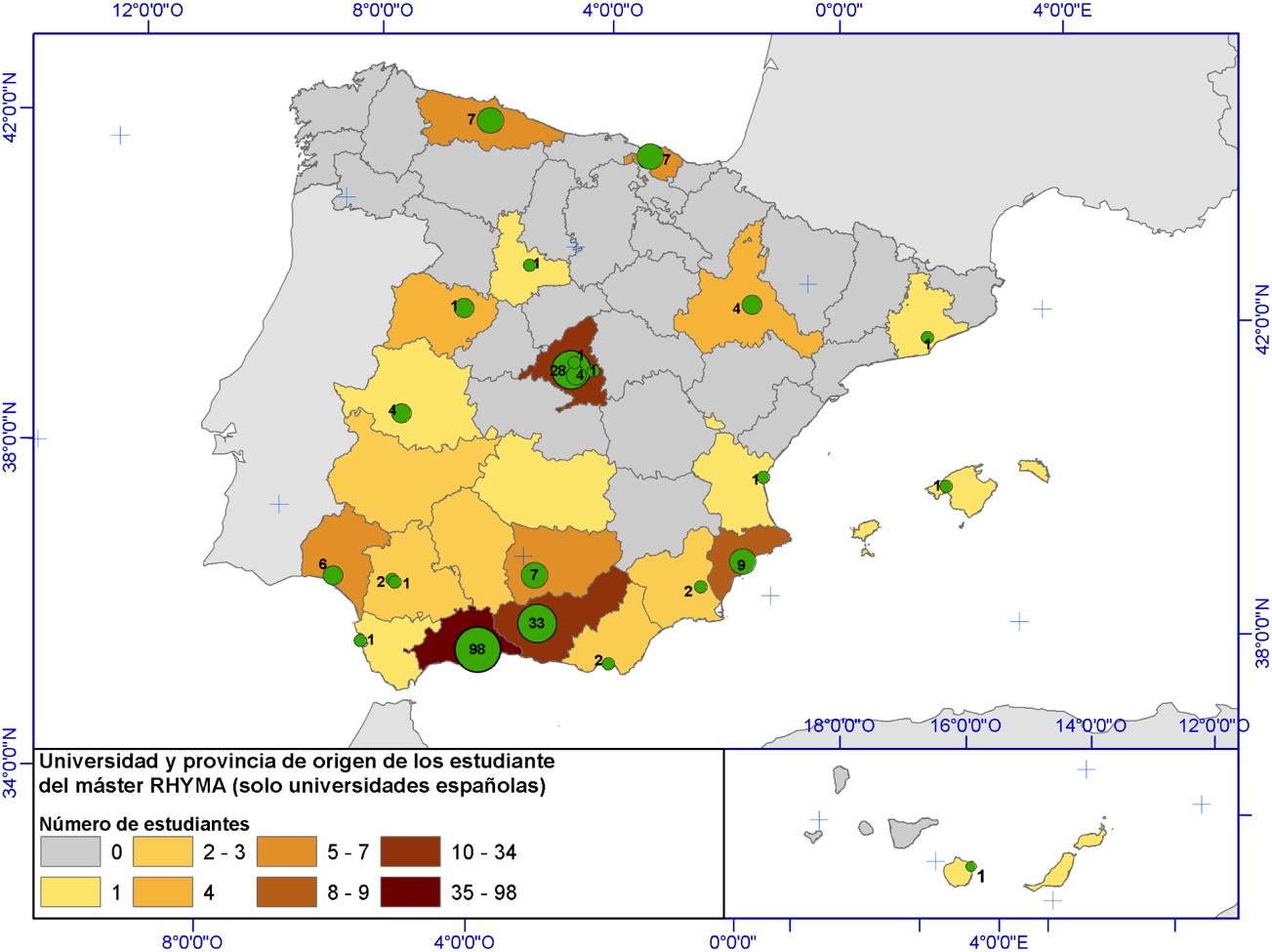
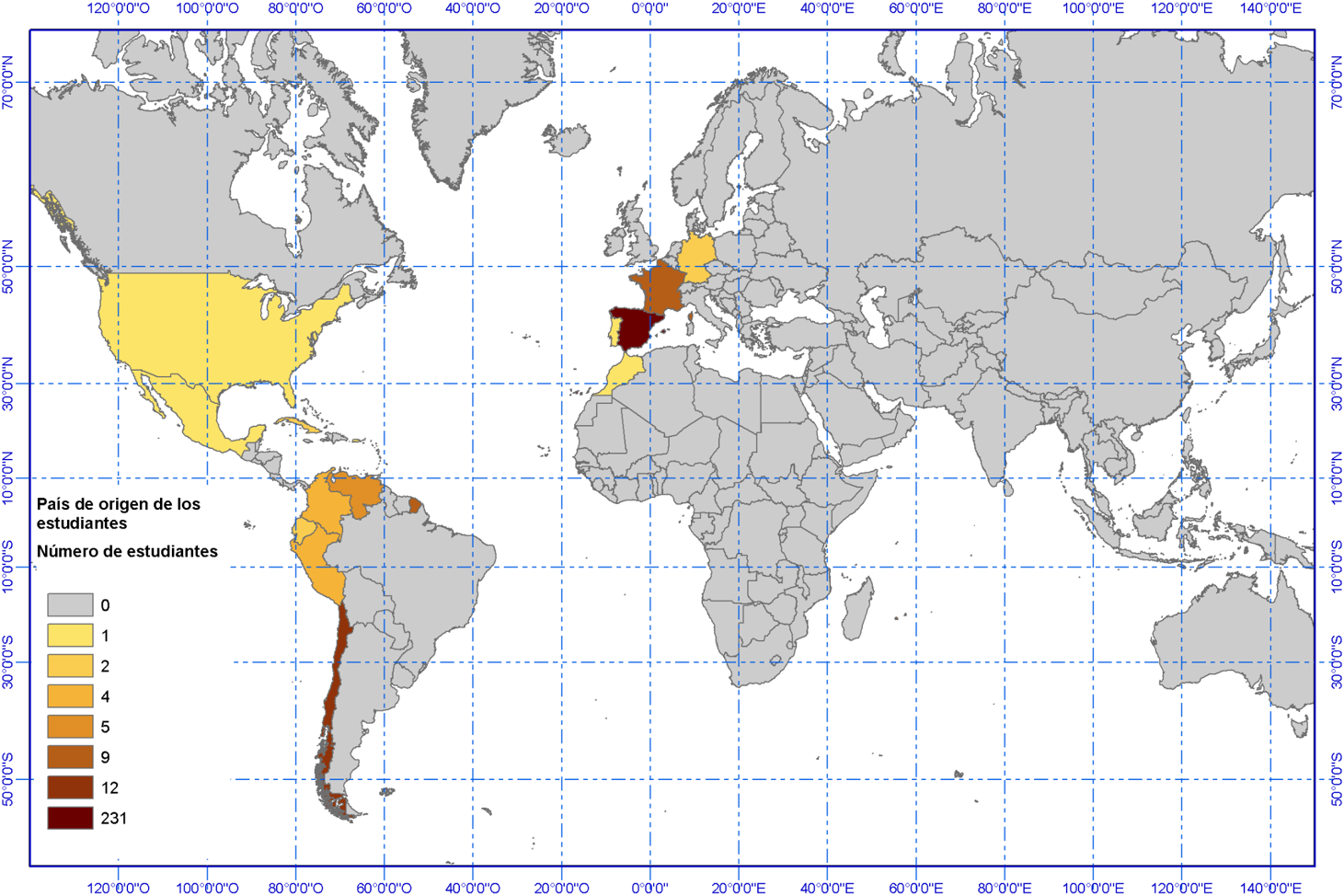
Employability
From the master's degree, and through the coordination group, regular monitoring of the work experience and the situation of the graduate students is carried out. The last update was in October 2022. This information, collected by one-person contact, is shown in aggregate form in the following graphs and tables (for privacy reasons, the data cannot be shown in greater detail).
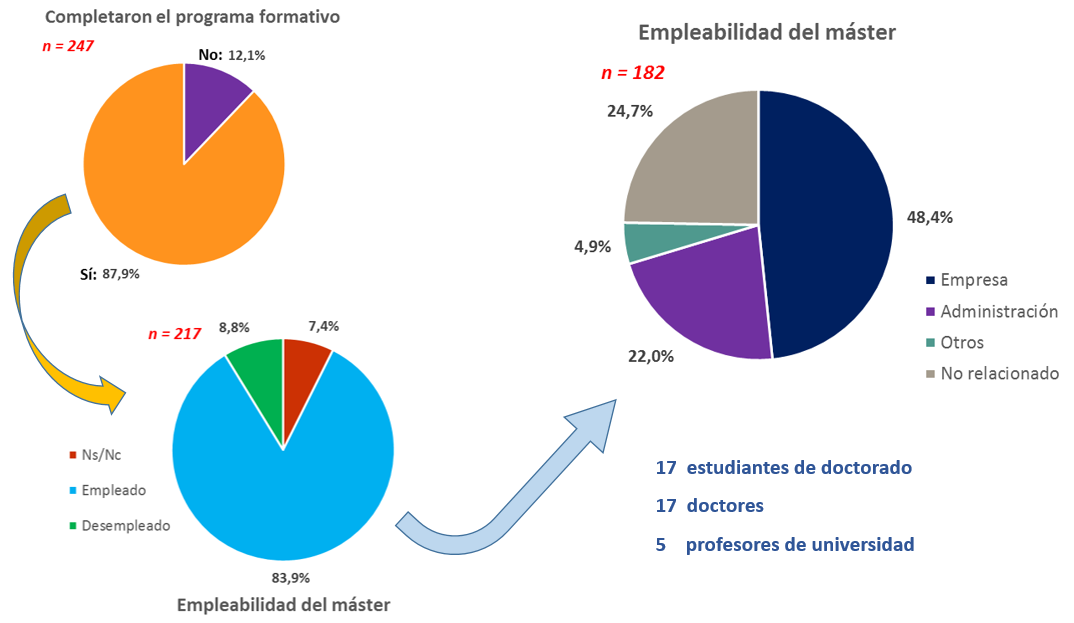
The procedure for the extinction of the title is established in PC13 (SUSPENSION / EXTINCTION OF THE TITLE) of the Quality Assurance System, and it establishes that:
- The suspension of an official degree taught by the Centers of the University of Malaga may occur due to cancellation in the Registry of Universities, Centers and Titles (RUCT), or because it is considered that the degree needs modifications so that a change occurs appreciable in its nature and objectives at the proposal of the Center and by approval of the Governing Council.
- Royal Decree 1393/2007 establishes that initially verified degrees must undergo an evaluation process by ANECA, or the Evaluation Bodies determined by the Law of the Autonomous Communities, every 6 years from the date of their registration in the RUCT , in order to maintain its accreditation. In accordance with article 27 of the aforementioned Royal Decree, the accreditation of the degrees will be maintained when they obtain a positive accreditation report. In the event of a negative report, it will be communicated to the University and the Council of Universities, so that the deficiencies found can be corrected. If not, the degree will cause withdrawal from the RUCT and will lose its official character and validity throughout the national territory, establishing in the corresponding resolution the necessary guarantees for students who are studying said studies. Therefore, a study plan will be considered extinct when it does not pass this accreditation process.
- The degree will also be suspended when, after modifying the study plans and communicating it to the Council of Universities for evaluation by ANECA (art. 28 RD 1393/2007), the ANECA considers that such modifications represent a transcendent change in the nature and objectives of the degree previously registered in the RUCT, which means that it is a new study plan and that a new degree will proceed accordingly.
- Finally, the suspension of an official degree could also occur when reasonedly proposed by the Center or body responsible for the degree and approved by the Governing Council of the University of Malaga.
In this case, the following criteria are established to guarantee the rights of students:
When an official degree is suspended, the University of Malaga will be obliged to guarantee the adequate effective development of the teachings that its students have started until their completion. The Center's Quality Assurance Commission, with the approval of the Center's Board, shall propose to the International Postgraduate Center and Doctoral School, for its approval and submission to the Governing Council, the criteria that guarantee the adequate effective development of the teachings that their students had begun until their completion, which will include, among others, the following points:
• Do not admit new entry registrations in the certification.
• The gradual suspension of teaching.
• The delivery of tutorial and orientation actions to repeating students.
• The right to evaluation until the calls regulated by the regulations that, for this purpose, exist at the University of Malaga are exhausted.
As established in the "Regulatory rules of the adaptation system to University Master's degrees, of students from studies that are extinguished by the implementation of said degrees", approved by the Governing Council of the University of Malaga, in a meeting held on March 30, 2009:
- Students at the University of Malaga, with a valid academic record, in the official university degrees that expire may adapt to the respective official university Master's degrees, in any academic year, without having to previously request the corresponding place from through the pre-registration procedure.
- The administrative procedure to carry out the adaptation referred to in the previous point will begin at the request of the interested party, addressed to the body responsible for the corresponding teachings, during the corresponding official period for the enrollment of students.
- The aforementioned adaptation will entail the right to formalize enrollment as a student of the respective official university Master's degree, without the need to request the corresponding place through the pre-enrollment procedure, as well as to obtain the recognition of credits in accordance with the provisions of the "Regulatory standards for the recognition and transfer of credits in Master's degrees" approved by the Governing Council of the University of Malaga in a session of March 30, 2009.


